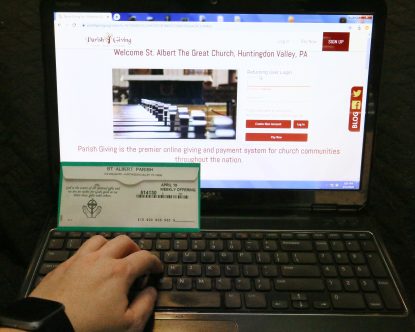
A member of St. Albert the Great Parish in Huntingdon Valley enrolls in an online program for weekly collections. In response to decreased giving during the coronavirus pandemic, the Catholic Foundation of Greater Philadelphia and the Archdiocese of Philadelphia have launched the Parish Support Initiative to offset financial losses area parishes are experiencing. (Photo by Sarah Webb)
A new fund has been created to help parishes in the Archdiocese of Philadelphia cope with the financial consequences of the coronavirus pandemic.
Last week, the nonprofit Catholic Foundation of Greater Philadelphia (CFGP) — which manages the annual Catholic Charities Appeal — launched the Parish Support Initiative in collaboration with the archdiocese.
The fund enables donors to support their own parishes, or those deemed most in need, through online gifts as well as checks.
Senior archdiocesan administrators, working with the archdiocesan Office for Parish Services and Support, will identify those parishes experiencing the most severe financial difficulties at this time.
“Just as so many aspects of our lives have been impacted by the coronavirus, our parishes are feeling the impact too,” said CFGP president and CEO Sarah Hanley.
Weekly collections provide “the vast majority of operating income, roughly 85%” for a parish, according to Arjun Dias, director of the Office for Parish Service and Support.
[hotblock]
“Most area parishes have seen significant declines” in collections, Dias said, with an average loss of 57%.
Although Masses and devotions have moved online, electronic giving at parishes has lagged, he added.
“While 87% of our parishes are equipped with e-giving, the utilization rate is roughly 20%,” Dias said. “So a lack of public Masses means declining collections.”
One archdiocesan pastor, speaking anonymously, noted that his collections have been “down 75 to 80%” compared to this same time last year.
The parish’s reserves and rental income from the parish’s school buildings cannot fully offset such a deficit, he said.
The parish has applied to the Small Business Administration’s Paycheck Protection Program, which provides forgivable loans to entities — including faith-based organizations — that keep all employees on the payroll for eight weeks.
However, the short-term federal initiative cannot fully address an array of other ongoing costs that can quickly drain parish accounts.
[hotblock2]
“After salary and benefits, you still have property and liability insurance, disability, worker’s compensation, pensions, building maintenance and utilities,” said one business manager at a parish where collections have fallen 30% in recent weeks.
Despite the fact that “utilities may be down” due to current church closures, “building maintenance remains the same,” he said. “Our lawns still need to be cut, and if the heater or the air conditioner breaks, we still have to fix it.”
Archbishop Nelson Perez has encouraged parishioners to contribute generously to the Parish Support Initiative, which he has highlighted during the livestreamed Masses he regularly celebrates at the Cathedral Basilica of SS. Peter and Paul.
As part of the effort, the CFGP is also offering resources to help pastors promote electronic giving and to remain connected to their parishioners.
Among these are sample email messages candidly reminding the faithful that parishes without sufficient funds risk closure.
The tone reflects the pandemic’s stark economic consequences throughout the world, as unemployment soars due to industry slowdowns and supply chain disruptions.
Kristalina Georgieva, managing director of the International Monetary Fund, projected in an April 9 message that the crisis would result in “the worst economic fallout since the Great Depression.”
Some 6.6 million Americans filed for unemployment last week, with Pennsylvania counting close to 200,000 claims in the five-county Philadelphia region between March 22 and April 4.
In an Easter message, Pope Francis called the global crisis a moment to recognize that “now more than ever, persons, communities and peoples must be put at the center” of recovery efforts.
***
For more information on the Parish Support Initiative, click here.
PREVIOUS: Stay-at-home orders put some kids at risk for abuse
NEXT: In times of plague, ‘greatest saints are born,’ says historian



Share this story